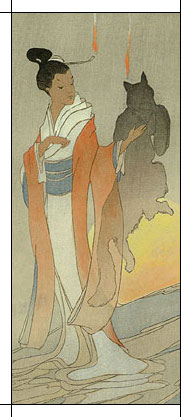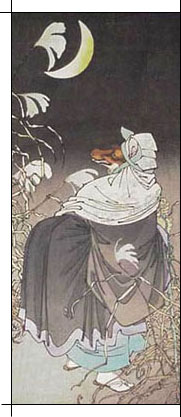
|
+ |
|
|
+ |
|
|
+ |
|
|
Western |
+ |
|
Vulpines |
+ |
|
+ |
|
|
+ |
|
|
That's not what they meant... |
+ |
|
Graves, roofs, and your own living room |
+ |
|
+ |
|
|
Where next? |
+ |
|
|
|


This story is the first known Japanese fox tale. Written by the monk Kyoukai in the late eighth or early ninth century, it gives a charming folk etymology for the word "kitsune." In the reign of Emperor Kinmei (that is, Amekuni-oshihiraki-hironiwa no mikoto, the emperor who resided at the Palace of Kanazashi in Shikishima [510-571 AD]), a man from Ouno district of Mino province set out on horseback in search of a good wife. In a field he came across a pretty and responsive girl. He winked at her and asked, "Where are you going, Miss?" "I am looking for a good husband," she answered. So he asked, "Will you be my wife?" and, when she agreed, he took her to his house and married her. Before long she became pregnant and gave birth to a boy. At the same time their dog also gave birth to a puppy, it being the fifteenth of the twelfth month. This puppy barked constantly at the mistress and seemed fierce and ready to bite. She became so frightened that she asked her husband to beat the dog to death. But he felt sorry for the dog and could not bear to kill it. In the second or third month, when the annual quota of rice [that is, the rice due to be sent to the capitol as taxes] was hulled, she went to the place where the female servants were pounding rice in a mortar to give them some refreshments. The dog, seeing her, ran after her barking and almost bit her. Startled and terrified, she suddenly changed into a wild fox and jumped up on top of the hedge. Having seen this, the man said, "Since a child was born between us, I cannot forget you. Please come always and sleep with me." She acted in accordance with her husband's words and came and slept with him. For this reason she was named "Kitsune" meaning "come and sleep." Slender and beautiful in her red skirt (it is called pink), she would rustle away from her husband, whereupon he sang of his love for his wife:
The man named his child Kitsune, which became the child's surname—Kitsune no atae. The child, famous for his enormous strength, could run as fast as a bird flies. He is the ancestor of the Kitsune-no-atae family in Mino province. [For another translation of this poem, see Japanese Ancient Romances.] In classical Japanese, "kitsu-ne" means "come and sleep," while "ki-tsune" means "come always." "Come and Sleep" is unusual for two reasons: One, the wife returns to her husband, although only at night. Once discovered, fox wives usually disappear, although their husbands may track them down and meet them briefly once or twice in the wild. Two, the fox-woman is credited with the founding of a family, whose descendants are chronicled rather than slipping into discreet anonymity once their role in the fox-woman's story has been fulfilled. One of these descendants, Mino no kitsune, is chronicled in another story by Kyoukai, "On a Contest Between Women of Extraordinary Strength." The woman Kitsune is not a fox spirit! She is a human woman named for her great-great-great grandmother, the fox-woman Kitsune. However, unlike the name of the fox-woman, the human woman's name is written with the character for "fox." On a Contest Between Women of Extraordinary Strength In the reign of Emperor Shoumu there was a woman of extraordinary strength in Ogawa Market, Katakata district, Mino province. She was large, and her name was Mino no kitsune (the fourth generation of the one whose mother was Mino no kitsune). Her strength equaled that of one hundred men. Living within the marketplace of Ogawa and taking pride in her strength, she sued to rob passing merchants of their goods by force. At that time there was another woman of great strength in the village of Katawa, Aichi district, Owari province. She was small (a granddaughter of the Venerable Doujou who once lived at Gangou-ji). As she heard that Mino no kitsune robbed passersby of their goods, she sought to challenge her by loading two hundred and fifty bushels of clams on a boat, and anchoring next to the market. In addition, she prepared and loaded on a boat twenty pliable vine whips. Kitsune came to the boat, seized all the clams, and had them sold. "Where did you come from?" she asked the owner of the clams, but she got no reply. She repeated the question, but again got no answer. After Kitsune had repeated the same question four times, the owner answered, "I don't know where I came from." Kitsune, insulted, rose to hit her. Thereupon the other woman seized Kitsune's two hands and whipped her once. The whip cut the flesh. Then she used another whip which also cut the flesh. Presently ten whips had cut the flesh. Kitsune said, "I give up! I am sorry for what I have done." The other woman, whose strength was obviously greater than Kitsune's, insisted, "From now on you shall not live in this market. If you dare do so, I will beat you to death." Completely subdued, Kitsune did not live in the market or steal again, and the people in the market rejoiced over the restoration of peace. There has always been someone in the world with great physical power. Indeed, we know such power is attained as a result of causes in past lives. ...through which we can see that the original Kitsune's virtue was not passed on to all of her descendants.
Nihon Ryouiki, I.2, "On Taking a Fox as a Wife and Bringing Forth a Child", and II.4, "On a Contest Between Women of Extraordinary Strength". |